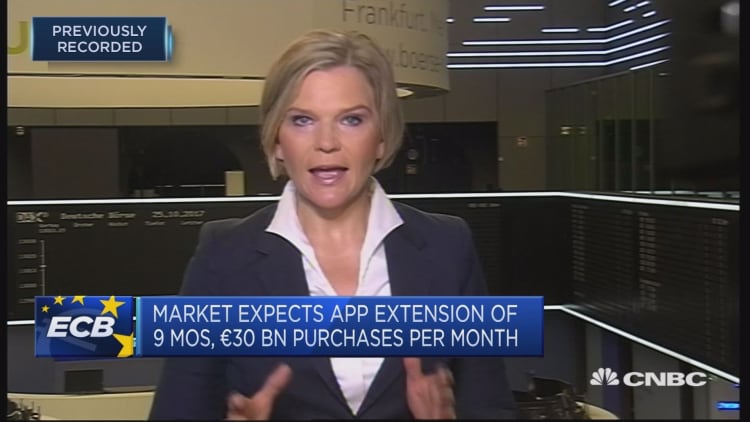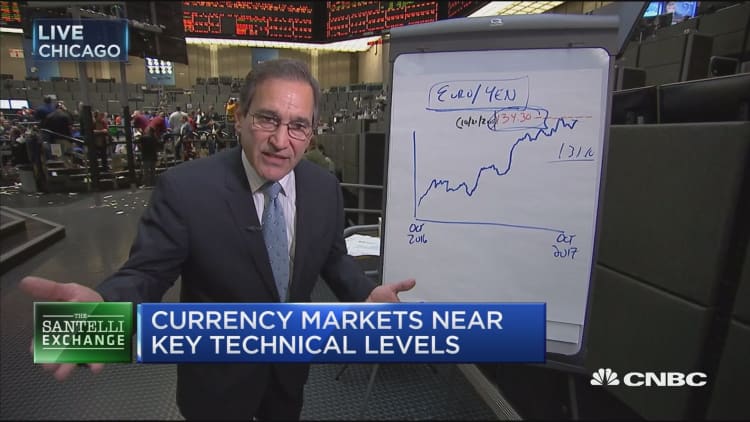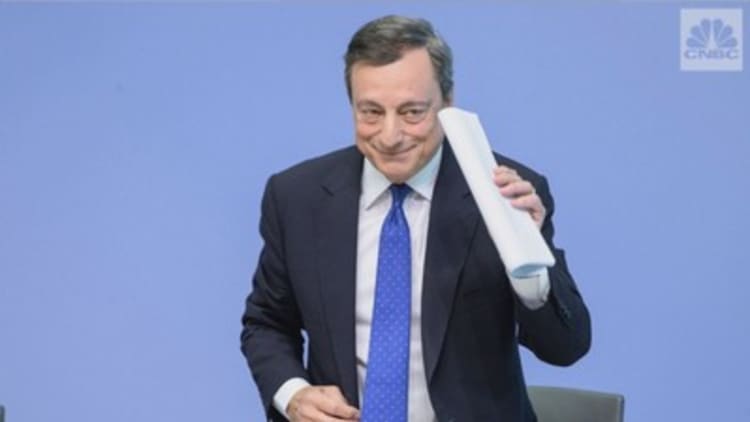
Mario Draghi, the president of the European Central Bank (ECB), is set to reveal details of a reduction in monetary stimulus Thursday in what could be the most eventful meeting of the central bank this year.
The expectation for this week's ECB meeting are very clear: Nothing less than the big "taper" plan for next year is expected from Mario Draghi. The big question though still is: How much will the ECB reduce the run rate of their asset purchase program and for how long will they extend it?
"We expect the ECB to announce next week (October 26) that it will cut its monthly asset purchases from 60 billion euros ($70.5 billion) to 30 billion euros as of January, with a commitment for nine months, i.e. until end-September 2018," said Reinhard Cluse, the chief European economist with UBS, said in a note.
"We think the ECB will leave open whether it will extend QE (quantitative easing) after September and hint that this decision will be taken in a data-dependent fashion, closer to the time."
That's the consensus view with some analysts even expecting a reduction — a so-called taper — to 25 billion euros with a longer extension until the end of 2018. Key in the ECB's thinking is the total volume of future purchases as there are estimates that only 250 billion euros to 300 billion euros of eligible assets are left to buy for the central bank.

"In our new call, our baseline is for QE to end in September 2018, implying a remaining universe of around 250 billion euros in market value, excluding new issuance (the remaining German universe is around 60 billion euros, with the ECB currently buying 11.7 billion euros per month on average)," said Societe Generale's ECB watcher Anatoli Annenkov in a note.
"Another factor that argues for a cautious buying approach by the ECB is growing concern over the willingness of investors to sell liquid and safe assets due to regulatory constraints," he said.
The central bank has remained ultra-accommodative in the years since the global financial crash and the euro zone sovereign debt crises, and also introduced U.S.-style quantitative easing (QE) — buying assets to stimulate lending — which is used to stoke inflation and boost the economy.
Tricky task
The great unwinding is a tricky task as inflation is still stubbornly below target and the members of the ECB's Governing Council do have diverging ideas of how to do it best. The so called "doves" fear the effects of a withdrawal of monetary support, arguing that inflation is still way below target and the so-called "hawks" call for an end of the purchase program sooner rather than later, pointing at the economic recovery.
"I don't see the need to continue pressing on the gas pedal of monetary policy and we are doing just this if we continue to make further purchases every month," Bundesbank President Jens Weidmann said in Washington D.C. on October 13.
"Communicating as to when and how we are going to exit from our asset purchase program is difficult. We know at some point, we need to get out," Bank of Italy Governor Ignazio Visco said October 10.
Rate hike after taper
One thing is clear though: The ECB will stay in the markets for a long time as ECB Chief Economist Peter Praet concluded in a speech October 12 in Washington D.C. "Crucially, the baseline scenario for future inflation remains contingent on easy financing conditions, which to a large extent, depend on the support of monetary policy," he said.

The Governing Council "will recalibrate its instruments accordingly, with a view to delivering the monetary policy impulse that remains necessary to secure a sustained adjustment in the path of inflation in a manner that is consistent with our monetary policy aim," he added.
Mario Draghi is also widely expected to stress so called "sequencing", meaning that rates will only be hiked after the complete end of QE. In Washington D.C. he said that the ECB's message that interest rates will remain low "well past" the bond-buying finishes is "very, very important."


